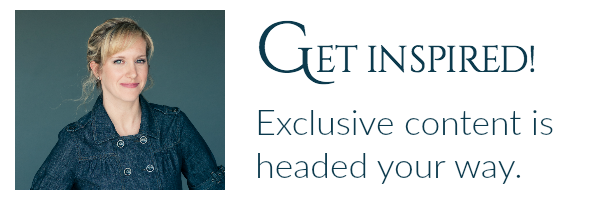by Kelli Stuart | Like a River From Its Course, Novel, publishing, Ukraine, veteran's stories, World War II
It’s funny how God puts people together.
Lee and I were freshly married and just beginning our life together in Frisco, Texas. We’d been in town for one week when we got together with a couple whose names I do not remember, nor do I recall how we were connected with them in the first place. I just remember going to lunch and telling these strangers that I needed a way to keep practicing my Russian language so I didn’t lose it.
“Oh, I know the perfect place!” the strange lady said. “There’s a gymnastics academy here in town run by Russians. You should go in an talk to them, and see if there’s a community here to get involved in.”
The next day, I visited the World Olympic Gymnastics Academy for the first time. Sometimes, I chuckle at my tenacity. I walked in and told the receptionist I was looking for someone who would speak Russian with me. She looked at me as if I had two horns growing out of my head, then led me into the gym and introduced me to Valeri Liukin and Evgeny Marchenko.
“I want to practice my Russian,” I said. Valeri cocked his head to the side slightly and smiled.
“Do you know anything about gymnastics?” he asked.
It just so happened I had been a competitive gymnast as a kid, and had coached on and off through high school and college. I nodded my head and he looked at Evgeny.
“Do you want a job?” he asked.
And so it was that I began working at WOGA not because I was looking to be a coach, but because I was looking for Russian speaking community. For two years, the coaches at WOGA took me under their wing, inviting me to parties, answering my incessant questions, helping me understand the nuances of the language I loved, and so much more.
They were my people, and it was them I was saddest to leave when we moved away.
The year after we moved, I contacted Evgeny with yet another odd request.
“I’m going to Ukraine to interview veterans for a book I want to write. Do you have any contacts there who can help me?”
It so happens, Evgeny’s mom lived in Vinnitsya, Ukraine, and within a week it was all set up for me to spend a few days with her.
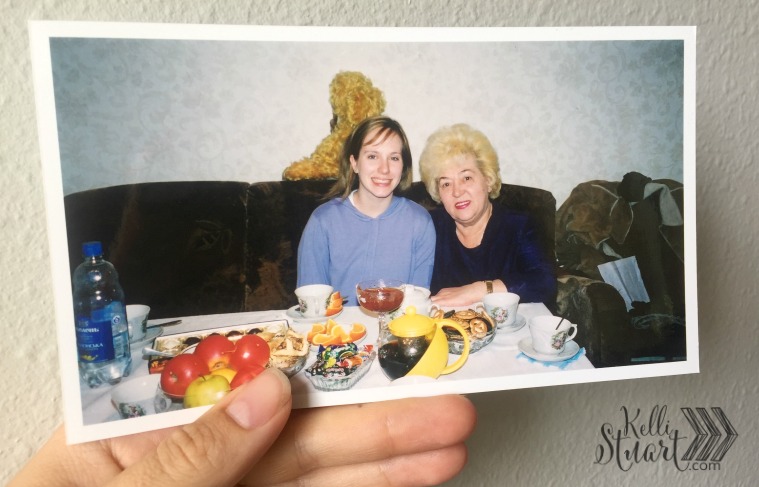
A pregnant, sick Kelli, with Victoria and her table full of food!
Victoria Marchenko welcomed my mom and I into her home with open arms, and a table brimming with food. I was sick when I arrived, having picked up a terrible cold on the trip, and she immediately took it upon herself to cure me with tea and vereniki (think dumplings filled with meat – yum!).
Victoria was a true gem. She mothered me for the next two days as she took me around town, introducing me to some of the most fascinating people I would meet in all my travels.
She took me to the home of her friend, Elizabeta Semenova, a woman who worked as a partisan and whose experience became central to the story of Luda.
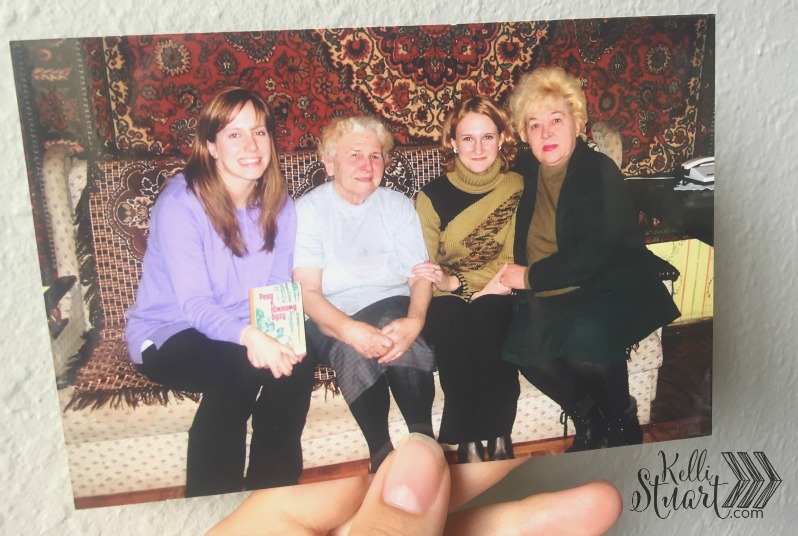
Me, Elizaveta, my dear friend Sveta, and Victoria in Elizabeta’s home.
She took me to a group of veterans who were one of the liveliest bunch of men I’ve ever met. They told their stories one at a time, and Victoria sat in the corner taking it all in. You could tell she was respected and admired within her community, and I felt a sense of pride just being in her presence. Somehow I knew I’d found a very special lady.
Victoria also told me about Vervolfy, Hitler’s underground bunker built just on the outskirts of Vinnitsya. Now just a meadow with no seeming significance (though the site has never been excavated, which gives it a mysterious quality), Victoria made sure I understood the gravity of what occurred at that place. Her description was so vivid and passionate that when I finally visited the site in person, I felt a hallowed awe for the men and women who died there.
This book wouldn’t have come together the way it did if it weren’t for Victoria Marchenko.
It wouldn’t have come together at all if I hadn’t been to audacious to walk into that gym so many years ago and just ask someone to talk to me. I mean, really – WHO DOES THAT?!
What a lovely thing it is to see the tapestry of this project woven together for such a time as this.

Speaking of the book, it’s time for another GIVEAWAY!
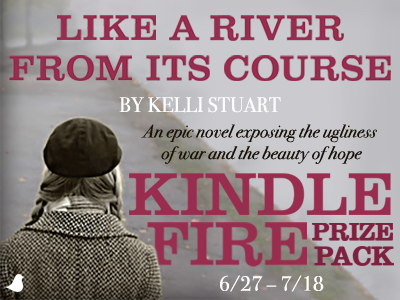
Litfuse Publicity Agency started their blog tour for Like a River From Its Course, and you have the opportunity to win big! They’re giving away a copy of the book, a Kindle Fire, a Kindle Fire case (winner’s choice), and a $30 Amazon gift card. And the best part is, it’s super easy to enter!
Don’t let this stop you from purchasing the book, though! Order your copy of Like a River From Its Course* today and find out why people are calling it the best book they’ve ever read.
If ever there was an opportunity for me to honor the memories of Victoria Marchenko, and all the men and women to whom she introduced me, this book is it.
Thanks for honoring them with me!
*affiliate link included
by Kelli Stuart | Like a River From Its Course, Novel, Ukraine, veteran's stories
We sat around a long table inside a very small room. It was hot and loud, all the sounds and smells mixing together in a cornucopia that threw my senses into overload.
They’d made pizza for me, because I’m American and they felt pizza would be a comforting reminder of home.
They weren’t wrong.
I’d been invited to this private meeting because I’d shown such an interest in Maria’s story. I’d peppered her granddaughter, Alyona, with so many questions that she finally offered to bring me to her grandmother so I could ask my questions in person.
As soon as I met Maria, I fell instantly in love, and it wasn’t hard to see why. She was a small woman, her bright silver hair pulled back into a loose bun. Her blue eyes sparkled when she spoke, and the lines that crinkled her face revealed years of tenderness and laughter.
Her family called her Baba Mysa, an affectionate term combining the tender form of “grandma” with a word that translates “little fly.” When Baba Mysa spoke, the room got quiet. We wanted to hear what she had to say, wanted to soak up her grace and wisdom.
As I wrote my story, I knew I wanted to tell Maria’s story, but I also wanted to honor the Maria that I knew – the grandmother who exuded warmth and strength. I wanted readers to know both versions of the same woman.
The character of Maria Ivanovna is loosely based on my Maria’s story of survival during those dark years in the war. But the character of Baba Mysa is based upon the older, wiser Maria who gifted her story to me.
And I fell madly in love with this character.
Baba Mysa’s background and story is entirely fictional, but her mannerisms, humor, and strength are not. Baba Mysa exudes dignity, hope and survival. I adored writing this character because through her I was able to honor the woman who endured indescribable hardships and refused to dwell on them.
Today, I’m sharing a brief excerpt from my upcoming novel, Like a River From Its Course. In this section, Baba Mysa is sharing her story with Luda, encouraging her not to get wrapped up in the pain of the past, but to dwell in the beauty of the present.
For more information on the book, visit the book page where you’ll find more links to some of the history that inspired these stories, as well as Pinterest-worthy images, and links where you can preorder your copy!
Be blessed, friends.
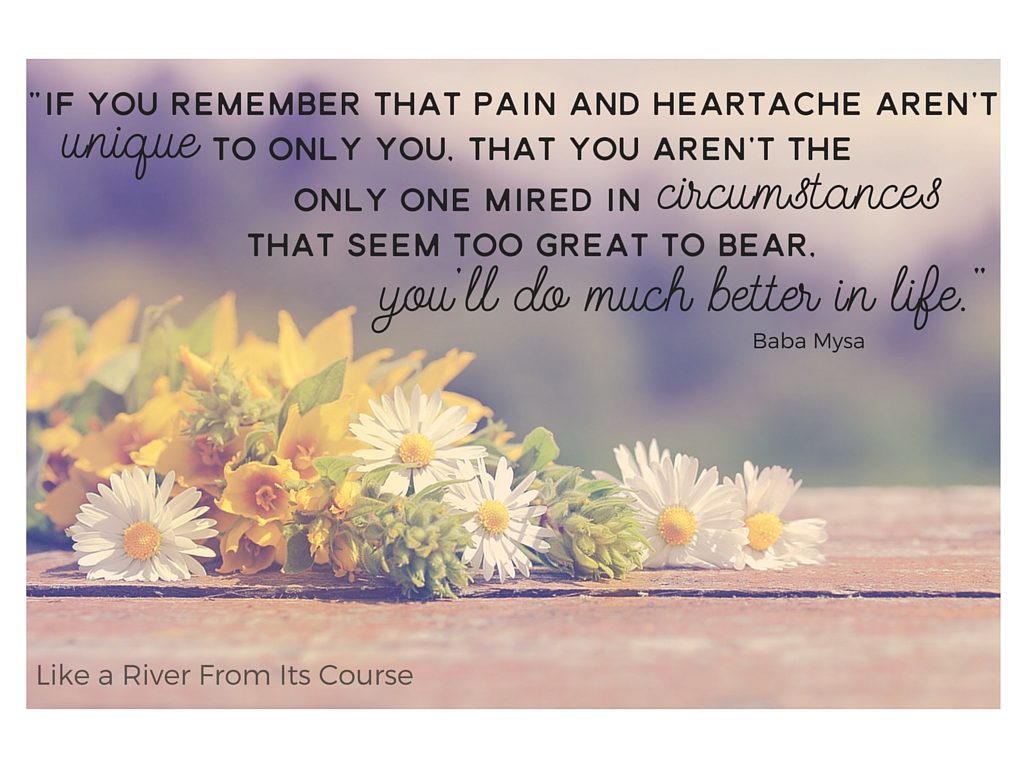
Like a River From Its Course: An Excerpt – Baba Mysa
Baba rocks slowly and rhythmically back and forth in her rocking chair, her hands moving in perfect rhythm. The yarn begins to take shape, a perfect hat for Sasha’s tiny head.
“I want to tell you a story, Luda,” she says. Her voice is soft and warm. I sigh as I melt back into my chair nodding my head in concession.
“I was born a long time ago, deep in the heart of Ukraine. My father was a farmer, and my mother was his strong and doting wife. I grew up among the rows of wheat and vegetables that my father grew.”
Setting her work in her lap, Baba Mysa leans back and a serene look overcomes her face.
“I can still smell the scent of the cherry trees that surrounded our small country house. I feel the cool air of fall and remember every bit of peace as I walked along behind my father through the rows of potatoes. Everything about that time was simple and sweet.”
She pauses, and I look at her impatiently. I enjoy hearing a bit about her childhood, but I don’t understand what she’s trying to communicate.
“When I was ten years old, my father took me into the fields to harvest the potatoes. For hours, we pulled plants from the ground and filled baskets, which we lined up in a long row at the edge of our field. My parents would clean the potatoes later in the day and sell most of them in the local market. At least, that’s what they did every year before this one.”
Baba Mysa’s voice trails off, and I study her face. Her eyes are bright and clear as she stares hard at the wall, the memory playing out before her on an invisible stage.
“On this day, as father and I neared the last row, he told me a joke. I don’t remember what the joke was, but I wish I did, because those were the last words he ever spoke to me.”
My eyes focus in tight as I absorb the shock of her story. Her eyes remain still on the wall, wide and pained.
“As I laughed at his silly words, a man on a large horse rode quickly up to us. He shouted something about danger coming and told us to run. My father told him to take me, and the man scooped me up and fled with me. My last vision of my father is the sight of him standing in the fields, covered in dirt, his arm up in a solitary wave good-bye. I never saw him again.”
It’s quiet for some time as I process Baba Mysa’s story. She wipes her eyes several times, and I don’t speak in order to give her time and space. After a few moments, I finally work up the courage to say something.
“I’m so sorry, Baba,” I say quietly. “I’m so sorry you had to go through that terrible ordeal. But . . .” I pause, unsure of how to proceed without sounding harsh. “I’m just not sure I understand what that story has to do with me,” I say, and then I cringe. The words sound so selfish coming out of my mouth, and I immediately regret them.
Baba Mysa turns her head and studies me closely. She nods in approval at my acknowledgement of, and reaction to, the selfishness in my statement and she waits a beat before responding.
“It has nothing to do with you, child,” she says firmly. “But you can learn from it.” I nod and wait for her to continue, figuring it’s best to remain quiet at this point.
Baba Mysa sighs, and her fingers begin moving in and out of the yarn on her lap once again. “Life is full of heartache and hardship,” she says. “Very rarely will life make sense, and it will almost never seem fair. But if you remember that pain and heartache aren’t unique to only you, that you’re not the only one mired in circumstances that seem too great to bear, you’ll do much better in life.”
©Kelli Stuart
by Kelli Stuart | Faith, Inspiration
I sat in the middle of a long table, a spread of foreign food laid out before me. It was hot in there, bodies compacted together, unfamiliar syllables and consonants mingling with the smells to overwhelm my senses entirely. I took it all in quietly, not really sure of my place inside this boisterous bunch. After a few minutes of simple observation, the meal was served, and I finally asked the question burning in my heart.
“How did you do it? How did you survive?”
It was 1995, and I was Kiev, Ukraine, in the home of Maria Ivanovna. I knew her story, having been told by her granddaughter who served as the translator for our group. I knew that she’d been sent to Germany at the age of 14 to serve in a slave labor camp. I knew she’d survived starvation and brutality, and at least one severe beating.
I knew that when the war finally ended, she found her way back to Ukraine by jumping on trains, sometimes clinging to the outside of a train car for hours.
I knew that her father was one of the few who survived Babi Yar, the killing ditch where nearly 34,000 men, women, and children were massacred in two days time in 1941.
I knew all the details, but what I couldn’t wrap my mind around was how.
How did this little woman with the silver hair and hearty laugh survive those years with her spirit in tact? How could she sit before me and tell her story without slipping into the horror of those years again?
How was she so…happy?
I wish I could remember her answer. I asked this question as a sixteen year old girl, long before the thought of writing a book ever took shape. I was just curious, and I remember the room growing quiet as my question was translated into a language I did not yet understand.
While I do not remember her exact words, I do remember the way she looked at me. Her eyes were a smile, peace shimmering in the depths as she focused tenderly on my face.
Though I don’t remember the exact words spoken at that dinner so many years ago, what I do remember is how I felt when we left that night. Maria made me feel brave.
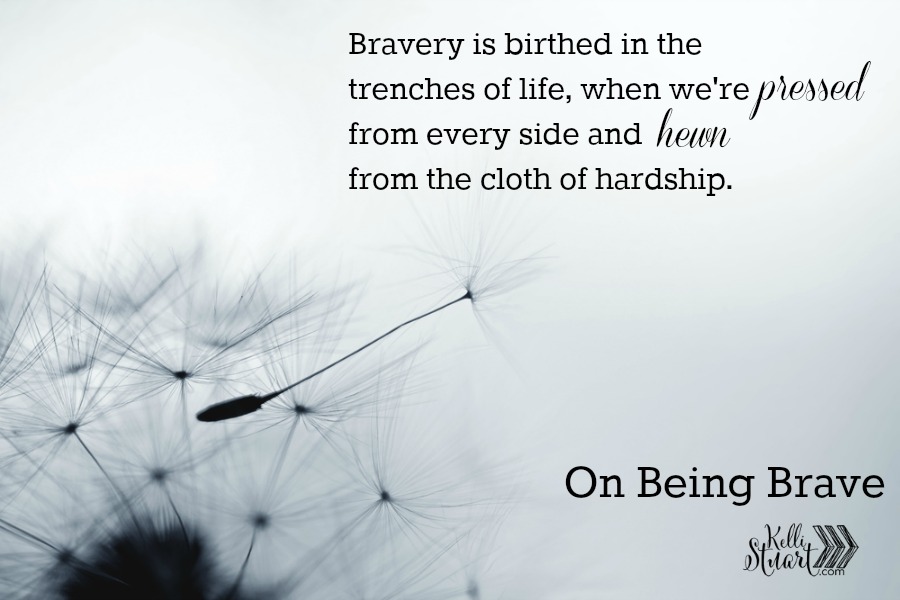
I’d never really thought of myself as brave before that night.
Adventurous, maybe. Impulsive, gregarious, excitable. But brave? Not really.
Like any sixteen year old girl, I battled insecurities on a daily basis. I found myself constantly fighting against the impulse to tuck into the corners of my life and reside in the shadows, because wouldn’t it be easier there? If I could minimize expectation, perhaps I could also minimize the threat of failure, of heartache, of any sort of emotional pain.
But there was something about Maria that made me feel like I could step out of the shadows.
It was the way that she carried her story, the way she so willingly gave her experience to me, like it was a treasured gift. There was no animosity, no bitterness, in her memories. She didn’t wear them like an albatross, walking victimized through the rest of her life.
Years later, I returned to Ukraine and I spent the afternoon with Maria’s granddaughter, Helen. Maria was sick and couldn’t take visitors at that time, but she took my questions over the phone through Helen’s translation. Even then, though grown and preparing to be a mother myself, I still wrestled with the cruelty and brutality of those dark war years.
I still didn’t understand how she did it – how any of the men and women who survived World War II did it.
But I’ve learned in the years since then that bravery isn’t something you’re born with – it’s something you learn.
[Tweet “Bravery isn’t something you’re born with – it’s something you learn.”]
Bravery is birthed in the trenches of life, when we’re pressed from every side and hewn from the cloth of hardship. But where does it come from?
“Have I not commanded you? Be strong and courageous. Do not be afraid; do not be discouraged, for the Lord your God will be with you wherever you go.” Joshua 1:9
If we truly understand the origins of bravery, then we just might see the potential waiting for us in the hard times. Bravery isn’t something that I can muster up on my own strength, though I suppose I could convince myself of that.
No, bravery and courage are most alive inside the power of the One who wove them into me in the first place.
The potential for bravery is knit into all of us, whether we see it or not. But the recognition of God as the author of that bravery unleashes a power far greater than any of us realize.
This is one of the many lessons I learned as a young woman in a foreign land. Bravery isn’t defined by rank or uniform, or even by experience. Bravery is simply lived and shared, and acknowledged in the hard places of life.
Be brave today, friends.


![]()



